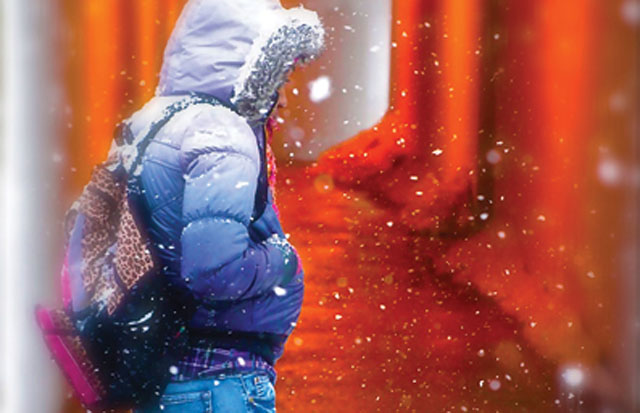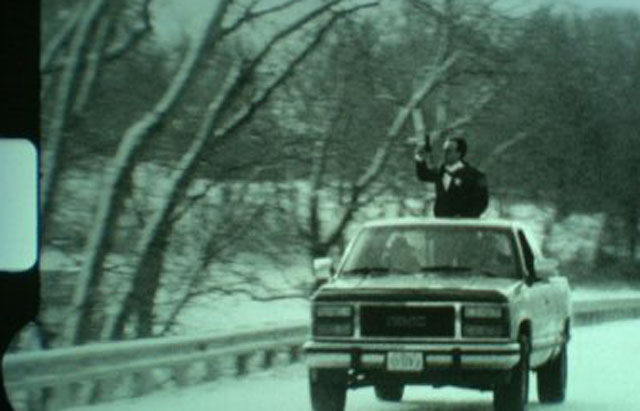CHICAGO – Patrick McDonald of HollywoodChicago.com appears on “The Morning Mess” with Dan Baker on WBGR-FM (Monroe, Wisconsin) on March 21st, 2024, reviewing the new streaming series “Manhunt” – based on the bestseller by James L. Swanson – currently streaming on Apple TV+.
Interviews: Illinois Short Filmmakers at 2011 Chicago International Film Festival
CHICAGO – One of the exciting events at the Chicago International Film Festival is the “City & State” Short Film Spotlight, highlighting local filmmakers presenting new or emerging short films. Two notable directors from the October 10th screening are Anna Musso (”L Train”) and Alaric S. Rocha (”Winter”).
“Winter” and “L Train” were shown, along with “The Vacuum Kid,” “The Ghosts,” “The Doctor’s Wife” and “The Truth” on City & State Shorts night, and HollywoodChicago.com caught up with two directors at the afterparty, talking to them about the background for their passionate short films.
 Anna Musso, Writer and Director of “L Train”
Anna Musso, Writer and Director of “L Train”
“L Train” is remarkable, using Chicago’s transit system as a symbol for life’s journeys. Sunny (Khadijah Davis) is a high school student whose misery is apparent on her daily commute. A chance encounter with a fellow passenger replaces that misery with something different, something that may be a cause for redemption.
Anna Musso grew up in the Chicago neighborhood where she set the film, the daughter of a police detective. She is now based in Los Angeles, and has worked as an assistant to director Alexander Payne.
 Photo credit: Social Construct |
HollywoodChicago.com: What was the spark that lit the flame for the story told in ‘L Train’?
Anna Musso: I grew up in Chicago in Jefferson Park, and went to film school in New York City. I moved to Los Angeles six years ago, and I came by the beginnings of the film when I was working in Hawaii on ‘The Descendants.’ I was working as an assistant to director Alexander Payne. He is very intuitive, and he kept asking me ‘what’s wrong?’ I finally told him it was very hard to watch him make a film when that’s what I’m dying to do myself.
The story genesis came about around Christmas of 1996. My parents were getting a divorce and I was going through a sh*tty time. I’m in the car with my father on Christmas Eve. There was a girl who walked in front of us with a pink backpack that was on brace crutches. I looked at this girl, and everything about my day change. You can’t quantify despair or happiness, but what you can do is encounter somebody else that allows your perspective to shift, and hopefully if we’re lucky in this world, gives you compassion to grow. That single, tiny moment of the girl walking in front of the car that was forgotten until after I wrote the film.
HollywoodChicago.com: In your opinion, what is the greatest challenge for your main character Sunny?
Musso: Living in the present. So much of her life is predicated on what the future will or will not be. She doesn’t have privilege, so much of her day is spent subconsciously thinking the future has nothing for her, and she doesn’t live in the present.
HollywoodChicago.com: How did you use the Chicago transit “El” [elevated train] as a character in your film?
Photo credit: Patrick McDonald for HollywoodChicago.com |
Musso: I was using it in terms of it being ‘elevated,’ as in elevated to something better, to escape from her circumstances and as fluidity. To me, the el train has always been the great equalizer. You see everybody on the train. The people that you think have an easy life, might not, and the opposite could hold true for those who have a hard life. I grew up with a property crimes detective as a father, and the reason I mention that is he would get me to watch people. When I was a kid, we’d ride around on the el train, and make up stories in our head about the people we saw. The point is we form these ideas in our head about what type of lives people lead, and they’re always wrong. The el train was a beautiful place to observe people, and try to understand their lives.
HollywoodChicago.com: Orson Welles said that being a filmmaker was the best train set a person could ever have. Which part of that ‘train set’ is your favorite, and how does that come out in your film?
Musso: It is the ‘white box.’ You get to shove people into a dark room and shine a light on a white box, and say this is what I think of the world. I have thoughts and opinions, and there they are.
HollywoodChicago.com: What challenges are in a short film, that you suspect are not in a longer narrative?
Musso: You have to know your sh*t. There is no lollygagging. My boss once told me that filmmaking is a constant search for economy, boiling it down to the irreducible and understanding that language. Being able to understand that language takes a long time, and like the Mark Twain quote ‘I didn’t have time to write a short letter, so I wrote a long one instead,’ short filmmaking is boiling it down and parceling just the right amount of information that people need.
 Alaric S. Rocha, Writer and Director of “Winter”
Alaric S. Rocha, Writer and Director of “Winter”
“Winter” is a unique take on a 1960s “Twilight Zone” TV episode, shot on the old school film format of Super 8 Millimeter. It is stark and surreal, flitting and encapsulating at the same time. Director Alaric Rocha realizes both a visual context and storytelling viewpoint in just a few short minutes.
 Photo credit: Blue Bassoon Pictures |
HollywoodChicago.com: You intentionally shot your film in Super 8, even showing the sprockets of the film. What kind of statement was this in contrast to the current digital age and effects?
Alaric S. Rocha: The film that was very inspirational for the style is the ‘Twilight Zone’ episode ‘An Occurence at Owl Creek Bridge.’ Although, of course, the film sprockets weren’t visible in that show, I wanted the format to ring strong for the audience and prove we just didn’t add digital filters or any other goodies at the end, that can be done so easily now. We really went back to the medium. In the filming process, there were so many uncertainties with 8 millimeter film because it is so small, moves around so much and it’s so much more difficult to control the lighting. I wanted all those uncertainties to be part of the finished film.
HollywoodChicago.com: What was the process of obtaining the right equipment for getting this retro look?
Rocha: I was very lucky that my director of photography had a lot of experience with 8 millimeter, because he grew up working with it. He used to have a lot of toys associated with that format, but he had gotten rid of it. I was lucky enough to be given a gift of a Super 8 millimeter camera when I was an undergrad, and it just sat on my shelf until I was able to use it for this film.
HollywoodChicago.com: Was it a sound format?
Rocha: We had no sound crew at all, all the sound was added in post production.
HollywoodChicago.com: When the main character escapes the chain gang in the film, the view is thrown off the ‘trail’ several times. Was that intentional in the script, or were you filming loosely on the set and figured out the journey afterward?
Rocha: I was pretty proud how we were able to stick to the script and storyboard. After we shot and edited everything, and showed it to test audiences, there was some confusion as to what happens to the prisoner, so I went back to post production to make it more clear.
HollywoodChicago.com: This is like a live action, hyper-real cartoon in a way. What happens next, in your estimation, to the story in your film?
Rocha: In keeping with the Twilight Zone episode, there would be an idea that all of this was in the prisoner’s imagination, that is how he is escaping his horrible existence at that point. In my films, I don’t like the ‘it was all a dream’ ambiguity, but I wanted to let the audience decide.
HollywoodChicago.com: What is the biggest challenge of the short film over the longer narrative?
Rocha: It’s getting the audience invested in the characters. It is difficult to get them to care about the people there, to like them, and get them to join you on the journey that you want the hero to take.
HollywoodChicago.com: Orson Welles said that being a filmmaker was the best train set a person could ever have. Which part of that ‘train set’ is your favorite, and how does that come out in your film?
Rocha: Technically, the camera is my favorite toy, and working with this new format made it even more exciting. Also, I’m usually very hands-on with the camera, and not knowing how this particular camera worked it was great to be more hands-off and let my Director of Photography take the reins.
 | By PATRICK McDONALD |


